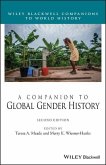A comprehensive review of World War II that offers a global-level analysis
Written for academics and students of history, World War II in Global Perspective, 1931-1953 presents a dynamic and global account of the historical events prior to, during, and after World War II. The author--a noted expert on the topic--explores the main theaters of the war and discusses the connections between them. He also examines the impact of the war on areas of the world that are often neglected in historical accounts, including Latin America, sub-Saharan Africa, and the so-called 'neutral' countries. This comprehensive text clearly shows how in the struggle against the Axis powers, the United States replaced Britain as the global superpower.
The author discusses the Japanese invasion of Manchuria in 1931 and the Korean War (1950-1953) and argues that the core years of the war (1939-1945) cannot be understood without considering the turbulent events that framed them. The text puts World War II in context as a series of large regional conflicts that intersected and overlapped, finally emerging as a genuine "world war" with the formal entry of the United States in late 1941. This vital text:
_ Offers a comprehensive review of World War II that frames it in a global context
_ Gives weight to the economic and political developments of the war
_ Provides a robust account of the main military campaigns
_ Contains illustrations and maps that themselves highlight little-known aspects of the global war
Hinweis: Dieser Artikel kann nur an eine deutsche Lieferadresse ausgeliefert werden.
Written for academics and students of history, World War II in Global Perspective, 1931-1953 presents a dynamic and global account of the historical events prior to, during, and after World War II. The author--a noted expert on the topic--explores the main theaters of the war and discusses the connections between them. He also examines the impact of the war on areas of the world that are often neglected in historical accounts, including Latin America, sub-Saharan Africa, and the so-called 'neutral' countries. This comprehensive text clearly shows how in the struggle against the Axis powers, the United States replaced Britain as the global superpower.
The author discusses the Japanese invasion of Manchuria in 1931 and the Korean War (1950-1953) and argues that the core years of the war (1939-1945) cannot be understood without considering the turbulent events that framed them. The text puts World War II in context as a series of large regional conflicts that intersected and overlapped, finally emerging as a genuine "world war" with the formal entry of the United States in late 1941. This vital text:
_ Offers a comprehensive review of World War II that frames it in a global context
_ Gives weight to the economic and political developments of the war
_ Provides a robust account of the main military campaigns
_ Contains illustrations and maps that themselves highlight little-known aspects of the global war
Hinweis: Dieser Artikel kann nur an eine deutsche Lieferadresse ausgeliefert werden.
"This [text] is [a] considerable achievement...Buchanan has successfully produced a 'grand narrative' account of the complex, multi-faceted, and truly global period we persist in calling the 'Second World War.'...It is a master-class of information management and writing with concision and clarity." - Ashley Jackson, Professor of Imperial and Military History, King's College London
"This lively, synthetic account of World War II as a global war...brings forth a wealth of engaging detail, brims with moments of revelation, and distinguishes itself by digesting the macrocosmic stakes of the war, while also moving past the major powers and battles into the texture of the war as it unfolded in a variety of nations and colonies, from Finland to Libya, Brazil to India, [and] Algeria to Belgrade." - Andrew Friedman, Associate Professor of History, Haverford College
"This lively, synthetic account of World War II as a global war...brings forth a wealth of engaging detail, brims with moments of revelation, and distinguishes itself by digesting the macrocosmic stakes of the war, while also moving past the major powers and battles into the texture of the war as it unfolded in a variety of nations and colonies, from Finland to Libya, Brazil to India, [and] Algeria to Belgrade." - Andrew Friedman, Associate Professor of History, Haverford College








